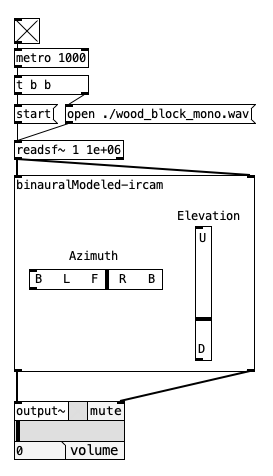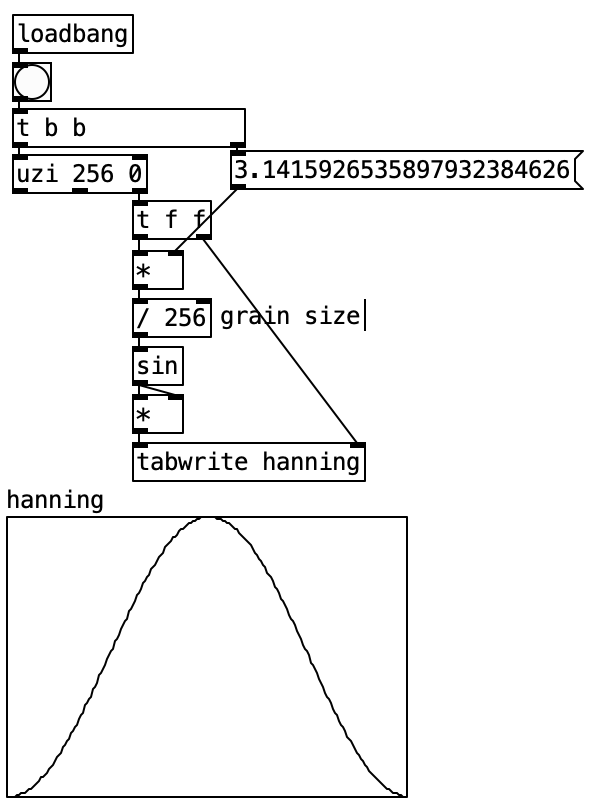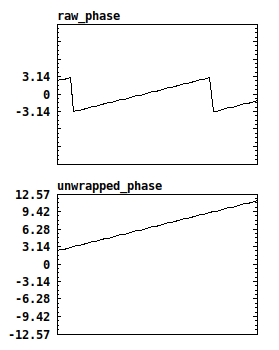-
 andresbrocco
posted in abstract~ • read more
andresbrocco
posted in abstract~ • read more@Obineg sorry for the delay!
Actually I'm not the one that designed the filters. I just copied the coefficients from a research published by IRCAM! That is mentioned at the readme file.
Regarding the LR phase difference, that's also a parameter provided by IRCAM (ITD), which I implemented using 2 delay~ lines, one for each channel.
Have you tested out? What do you think of the performance? Does it sound good for your ears?
-
 andresbrocco
posted in abstract~ • read more
andresbrocco
posted in abstract~ • read moreAhh, indeed! I forgot to mention that

The goal is to be pure vanilla, so I'll replace it with:[*~ -1]
|
[+~ 1]Thanks @FFW and @alexandros
-
 andresbrocco
posted in abstract~ • read more
andresbrocco
posted in abstract~ • read moreHey @alexandros. that's not a typo!
 That's short for [expr(1-$f1)]: the exclamation point reverses the order of the inlets when preceding basic math operators + - * /
That's short for [expr(1-$f1)]: the exclamation point reverses the order of the inlets when preceding basic math operators + - * / -
 andresbrocco
posted in abstract~ • read more
andresbrocco
posted in abstract~ • read moreAn efficient binaural spatializer
The "binauralModeled-ircam" object is a pure-vanilla implementation of the binaural model created at IRCAM.. An example of its capabilities can be found at this page.
The object is found at my repository: https://github.com/andresbrocco/binauralModeled-pd
Main concept
Basically, it applies ITD and approximates the HRTF to a series of biquad filters, whose coefficients are avaliable here.
Sample Rate limitation: those coefficients work for audio at 44100Hz only!
Space interpolation
There is no interpolation in space (between datapoints): the chosen set of coefficients for the HRTF is the closest datapoint to the given azimuth and elevation (by euclidean distance).
Time interpolation
There is interpolation in time (so that a moving source sound smooth): two binauralModels run concurrently, and the transition is made by alternating which one to use (previous/current). That transition occurs in 20ms, whenever a new location is received.
Interface
You can control the Azimuth and Elevation through the interface, or pass them as argument to the first inlet.

Performace
Obs.: If the Azimuth and elevation does not match exactly the coordinates of a point in the dataset of HRTFs, the object will perform a search by distance, which is not optimal. Therefore, if this object is embedded in a higher level application and you are concerned about performance, you should implement a k-d tree search in order to find the exact datapoint before passing it to the "binauralModeled-ircam" object.
Ah, maybe this statement is obvious, but: it only works with headphones!
-
 andresbrocco
posted in technical issues • read more
andresbrocco
posted in technical issues • read moreJust to document it here. If you want to create a hann window and store it in an array, you can do the following:

-
 andresbrocco
posted in technical issues • read more
andresbrocco
posted in technical issues • read more@ddw_music I totally agree with you. That makes me nervous sometimes

Maybe @Miller Puckette could change this behaviour in future releases? I would be glad
-
 andresbrocco
posted in patch~ • read more
andresbrocco
posted in patch~ • read moreThanks for replying, @il-pleut I've edited the original post!
-
 andresbrocco
posted in patch~ • read more
andresbrocco
posted in patch~ • read moreHello, I made a patch to undo what [wrap~] does.
It basically remove discontinuities when the signal jumps from -pi to pi or vice-versa. As shown in the image below:

I personally needed for unwrapping phase before applying complex logarithm when I was trying to implement liftering in the complex cepstrum... (What didnt go so well, by the way...)
Hope it's useful for someone else - The patch is pure vanilla.
-
 andresbrocco
posted in technical issues • read more
andresbrocco
posted in technical issues • read moreThere is an object in the iemmatrix that implements the fletcher-Munson curve (equal loudness contour)... Take a look!
-
 andresbrocco
posted in technical issues • read more
andresbrocco
posted in technical issues • read more@solipp, I want to get high resolution in both frequency and time.
So if I do an FFT after every block, I get high resolution in time, but the block is too small, so I zeropad it to increase frequency resolution.
